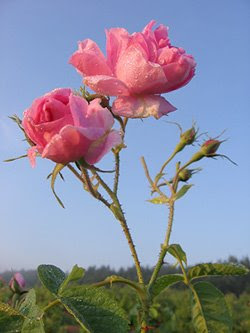 Benefits of Buying Organic
Benefits of Buying Organic1. Chemical free food/herbs. (Need we say more?)
2. Natural sustainable agriculture. (Organic crops build healthy soil through crop rotation, using composting methods, and relying on natural cycles of life to help reap bountiful harvests)
3. Farm worker safety. (Non-organic harvesters are directly exposed to agricultural chemicals. Adding enormous health risks, skin irritations, lung degeneration, and several known cancers. Organic harvesters need not worry about this)
4. Reduced pollution. (Organic agriculture avoids substances that contribute toair, water, and soil pollution and it does not contribute to the problem of chemical manufacturing and waste disposal)
5. Our bodies will thank us!
Some Interesting Facts Concerning Pesticides
1. The EPA estimates that US sales of pesticides in 2000-2001 exceeded $11 billion dollars, thus representing over 2 billion pounds of pesticides being dumped on U.S. farm soil, homes, gardens, schools, golf courses and more. This number is about 8 pounds for every man, woman and child in the entire country.
2. There are over 21,000 different pesticides on the U.S. market containing over 875 active compounds. Many of these have been proven to have health implications and the others are unknown.
3. In the study, "Food and the Environment: A Consumer's Perspective," 86 percent of respondents said they believe there is a connection between the health of the environment and their own well-being.
4. Since 1945, total U.S. crop losses from insect damage have nearly doubled. During the same time, insecticide use has increased tenfold. Today, seventy-one known carcinogenic pesticides are sprayed on food crops. (In Harmony's report, "Pesticides: Losing Their Effectiveness")
5. EPA estimates that there are approximately 20,000 physician diagnosed pesticide poisonings each year among agricultural workers. These are only thee ones which have been reported.
6. The EPA reports that Americans ingest and are exposed to over 167 times more dioxin every day than the acceptable daily level.
7. According to the U.S. General Accounting Office, only 1% of all imported fruits and vegetables are tested by the Food and Drug Administration for illegal pesticide residues.
8. The CDC has gone on record as stating… “Pesticides are toxic to life forms by their very design”
Use At Least 10% Organic For A Better World
Here are some statistics concerning the incorporation of organic products into our own lifestyles which we find to be faithful and staggering.By converting at least 10% of your food, fiber and cosmetic purchases you will;
Eliminate pesticides from 98 million daily U.S. servings of drinking water.
Assure 20 million daily servings of milk that are produced without antibiotics & genetically modified growth hormones.
Assure 53 million daily servings of pesticide-free fruit and vegetables. (Enough for 10 million kids to have five daily servings.)
Eliminate use of growth hormones, genetically engineered drugs and feeds, and 2.5 million pounds of antibiotics used on livestock annually. (More than twice the amount of antibiotics used to treat human infections.)
Assure that 915 million animals are treated more humanely.
Fight climate change by capturing an additional 6.5 billion pounds of carbon in soil. (That's the equivalent of taking 2 million cars, each averaging 12,000 miles per year, off the road.)
Eliminate 2.9 billion barrels of imported oil annually. (Equal to 406,000 Olympic eight-lane competition pools.)
Restore 25,800 square miles of degraded soils to rich, highly productive cropland. (An amount of land equal to the size of West Virginia.)































